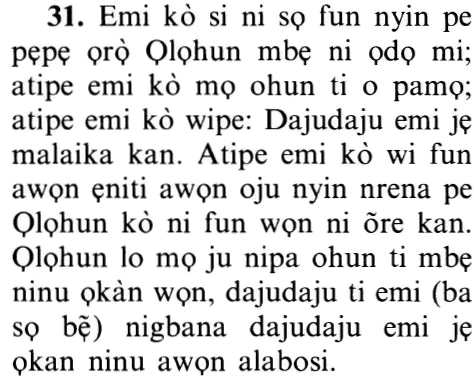11vs31
Select any filter and click on Go! to see results
وَلاَ أَقُولُ لَكُمْ عِندِي خَزَآئِنُ اللّهِ وَلاَ أَعْلَمُ الْغَيْبَ وَلاَ أَقُولُ إِنِّي مَلَكٌ وَلاَ أَقُولُ لِلَّذِينَ تَزْدَرِي أَعْيُنُكُمْ لَن يُؤْتِيَهُمُ اللّهُ خَيْراً اللّهُ أَعْلَمُ بِمَا فِي أَنفُسِهِمْ إِنِّي إِذاً لَّمِنَ الظَّالِمِينَ
Wala aqoolu lakum AAindee khazainu Allahi wala aAAlamu alghayba wala aqoolu innee malakun wala aqoolu lillatheena tazdaree aAAyunukum lan yutiyahumu Allahu khayran Allahu aAAlamu bima fee anfusihim innee ithan lamina alththalimeena
Index Terms
Click to play
Yoruba Translation

Hausa Translation
"Kuma bã ni ce muku a wurĩna taskõkin Allah suke kuma bã inã sanin gaibi ba ne. Kuma ba inã cħwa ni Malã´ika ba ne. Kuma ba ni cħwa ga waɗanda idãnunku suke wulãkantãwa, Allah bã zai bã su alhħri ba. Allah ne Mafi sani ga abin da yake cikin zukatansu. Lalle ne ni, idan (nã yi haka) dã ina daga cikin azzalumai."
Asbabu n-Nuzuul (Occasions of Revelation)
Allah tells what Nuh said to his people;
وَلاَ أَقُولُ لَكُمْ عِندِي خَزَآئِنُ اللّهِ وَلاَ أَعْلَمُ الْغَيْبَ وَلاَ أَقُولُ إِنِّي مَلَكٌ وَلاَ أَقُولُ لِلَّذِينَ تَزْدَرِي أَعْيُنُكُمْ لَن يُؤْتِيَهُمُ اللّهُ خَيْرًا اللّهُ أَعْلَمُ بِمَا فِي أَنفُسِهِمْ إِنِّي إِذًا لَّمِنَ الظَّالِمِينَ ﴿٣١﴾
And I do not say to you that with me are the treasures of Allah, nor that I know the Ghayb; nor do I say I am an angel, and I do not say of those whom your eyes look down upon that Allah will not bestow any good on them. Allah knows what is in their inner selves. In that case, I should, indeed be one of the wrongdoers.
Nuh is informing them that he is a Messenger from Allah, calling to the worship of Allah alone, without any partners and he is doing this by the permission of Allah.
At the same time, he is not asking them for any reward for this work. He invites whomever he meets, whether of nobility or low class. Therefore, whoever responds favorably, then he has achieved salvation.
He also explains that he has no power to manipulate the hidden treasures of Allah, nor does he have any knowledge of the Unseen, except what Allah has allowed him to know. Likewise, he is not an angel, rather, he is merely a human Messenger aided with miracles.
Nuh goes on to say, "I do not say about these people whom you (disbelievers) detest and look down upon, that Allah will not reward them for their deeds. Allah knows best what is in their souls. If they are believers in their hearts, as their condition appears to be outwardly, then they will have a good reward. If anyone behaves evilly with them after they have believed, then he is a wrongdoer who speaks what he has no knowledge of.
يخبرهم أنه رسول من الله يدعو إلى عبادة الله وحده لا شريك له بإذن الله له في ذلك ولا يسألهم على ذلك أجرا بل هو يدعو من لقيه من شريف ووضيع فمن استجاب له فقد نجا ويخبرهم أنه لا قدرة له على التصرف في خزائن الله ولا يعلم من الغيب إلا ما أطلعه الله عليه وليس هو بملك من الملائكة بل هو بشر مرسل مؤيد بالمعجزات ولا أقول عن هؤلاء الذين تحقرونهم وتزدرونهم إنهم ليس لهم عند الله ثواب على أعمالهم الله أعلم بما في أنفسهم فإن كانوا مؤمنين باطنا كما هو الظاهر من حالهم فلهم جزاء الحسنى ولو قطع لهم أحد بشر بعد ما آمنوا لكان ظالما قائلا ما لا علم له به .
"ولا أقول لكم عندي خزائن الله ولا" إني "أعلم الغيب ولا أقول إني ملك" بل أنا بشر مثلكم "ولا أقول للذين تزدري" تحتقر "أعينكم لن يؤتيهم الله خيرا الله أعلم بما في أنفسهم" قلوبهم "إني إذا" إن قلت ذلك
أخبر بتذلله وتواضعه لله عز وجل , وأنه لا يدعي ما ليس له من خزائن الله ; وهي إنعامه على من يشاء من عباده ; وأنه لا يعلم الغيب ; لأن الغيب لا يعلمه إلا الله عز وجل .
I'raab - grammatical analysis of the Qur'an
«وَلا» الواو عاطفة ولا نافية.
«أَقُولُ» مضارع فاعله مستتر.
«لَكُمْ» متعلقان بأقول.
«عِنْدِي» ظرف مكان متعلق بالخبر المقدم والياء مضاف إليه.
«خَزائِنُ» مبتدأ.
«اللَّهِ» لفظ الجلالة مضاف إليه والجملة مقول القول.
«وَلا أَعْلَمُ» معطوف على ولا أقول وإعرابه مثله.
«الْغَيْبَ» مفعول به.
«وَلا أَقُولُ» معطوف على ما قبله.
«إِنِّي مَلَكٌ» إن واسمها وخبرها والجملة مقول القول.
«وَلا أَقُولُ» معطوف على ما سبق.
«لِلَّذِينَ» متعلقان بأقول.
«تَزْدَرِي» مضارع مرفوع بالضمة المقدرة على الياء للثقل.
«أَعْيُنُكُمْ» فاعل مرفوع والكاف مضاف إليه والجملة صلة.
«لَنْ» حرف ناصب.
«يُؤْتِيَهُمُ» مضارع منصوب والهاء مفعوله الأول المقدم.
«اللَّهِ» لفظ الجلالة فاعل.
«خَيْراً» مفعول به ثان والجملة مقول القول.
«اللَّهُ أَعْلَمُ» لفظ الجلالة مبتدأ وأعلم خبر.
«بِما» ما موصولية ومتعلقان بأعلم.
«فِي أَنْفُسِهِمْ» متعلقان بصلة الموصول المحذوفة.
«إِنِّي» إن واسمها والجملة تعليل لا محل لها.
«إِذاً» حرف جواب.
«لَمِنَ الظَّالِمِينَ» اللام المزحلقة والجار والمجرور متعلقان بالخبر المحذوف.
